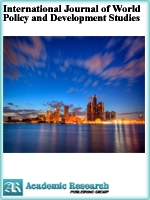International Journal of World Policy and Development Studies
Online ISSN: 2415-2331
Print ISSN: 2415-5241
Print ISSN: 2415-5241
Quarterly Published (4 Issues Per Year)

Archives
Volume 5 Number 9 September 2019
Dynamic Relationship Between Global Oil Price and the Eswatini’s Exchange Rate: A Toda-Yamamoto Approach
Authors: Sotja G. Dlamini
Pages: 82-86
DOI: doi.org/10.32861/ijwpds.59.82.86
Abstract
Globalization and liberalization puts the emphasis on exports as a technique in which developing countries like the Kingdom of Eswatini should adopt to expand their markets beyond their domestic market. For the developing countries to be international competitive in the global markets they need to minimize their production cost particularly on the products that are being exported. The production of most of the exported commodities needs lot energy from oil; hence there has been tremendous increase of oil and its by-product worldwide. The current oil demand for most countries in the world is not met because of insufficient reserves for crude oil in most countries. The Kingdom of Eswatini does not have an oil reserves or oil-refining facilities hence they depends on imports from the neighbouring states in order to meet the consumption requirement. The oil price shocks in the global market normally have adversely effects on various macroeconomic variables such as exchange rate since the oil is traded in US dollars. Oil and exchange rate are considered to be essential factors for domestic economies for developing countries like the Kingdom of Eswatini. The purpose of the study is to investigate the causal relationship between Lilangeni-dollar exchange rate and crude oil price by using the Toda-Yamamota approach. The study used daily time series from January 01st, 2005 to April 30th, 2018 of nominal exchange rate of Lilangeni (Eswatini currency [SZL]) vis-à-vis United States dollar (USD) data as well as the global price of Brent crude oil data that was used as a proxy for the Global crude oil price. The results from the Toda-Yamamoto Granger causality test revealed that there is a unidirectional causality from the global oil price to the Eswatini’s nominal exchange rate (SZL/USD). Hence the study concluded that the global crude oil price influence the Eswatini’s nominal exchange rate. Therefore the study recommends that in the formulating of Eswatini’s exchange rate policy emphases should be on the global oil prices in order not to misalign the Eswatini’s currency.



